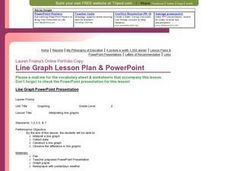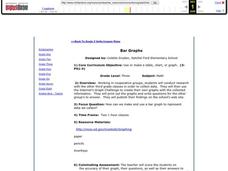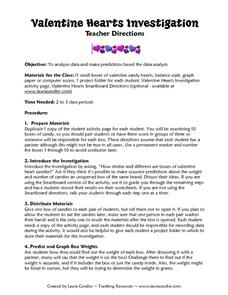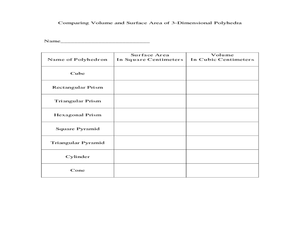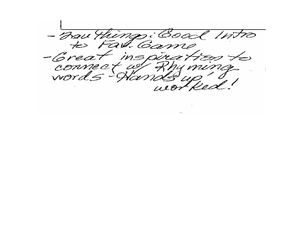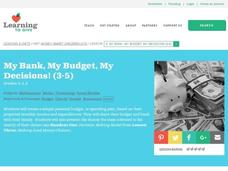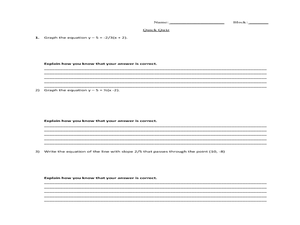Curated OER
Interpreting Line Graphs
Fifth graders interpret line graphs. In this graphing lesson, 5th graders first begin by reviewing the difference in bar and line graphs and what they are used for. Students practice interpreting the data on various line graphs and using...
Curated OER
Put the Elephant First
Students recreate the order of animals they read about in a book. In this relative positions lesson, students color and cut out pictures of animals in the book. Sudents glue these onto construction paper and line up like the animals in...
Curated OER
The Human Graph
Students produce a graph of favorite colors. For this graphing lesson, students create a human graph based on their favorite color then the teacher transfers the data to a bar graph. Students compare the lines on the graph before...
Curated OER
Patterns
Second graders work with different types of patterns. In this pattern activity, 2nd graders go to a pattern block webpage and use Unifix cubes to create their own patterns. They find patterns in the real world and draw their own examples.
Curated OER
Agriculture Counts
Students discuss the kinds of things they count and how to use tally marks. In this social science activity, students count animal crackers by using tally marks for each kind of animal. The tally marks are changed into numbers and one...
Curated OER
Interpreting Data and Statistics
Students define random sample and complete surveys. For this algebra lesson, students create surveys and define the way people analyze these results. They discuss random sample as it relates to the Great Depression and come up with their...
Curated OER
Investigation - Square Numbers and Triangle Numbers
Fifth graders investigate growth patterns using blocks. In this square and triangle numbers lesson, 5th graders predict sizes of larger triangles and squares based on numerical patterns they observed while building.
Curated OER
Bar Graphs
Third graders investigate bar graphs. In this third grade mathematics lesson, 3rd graders collect and analyze data and use the internet’s Graph challenge to create their own graphs. Students write questions for the other students to...
Curated OER
Around the Town
Learners explore reading maps. In this map reading lesson, students compare distances fom place to place. Learners work in groups and predict the distance then find the actual distance using string or rulers.
Curated OER
Pocket Change
Students practice identifying coins and their values. In this money identification lesson, students play a game, where they toll a coin, determine the value, and compare totals to win.
Curated OER
Size Them Up
Students arrange containers by their capacity. In this volume lesson, students place containers in order by increasing capacity. Students discuss how the tallest container doesn't necessarily hold the largest amount.
Curated OER
Valentine Hearts Investigation
Students practice analyzing data and making predictions. In this 2nd - 3rd grade lesson plan, students investigate and compare data gathered using boxes of valentine candy hearts. Students examine the different boxes of candy provided,...
Curated OER
Making Good Money Choices
High schoolers determine how to spend donated money. In this money choices lesson, students explore the needs of the community. They determine the best use of donated funds for a good cause or charity. High schoolers play a bingo game to...
Curated OER
Money and Business (Art)
Third graders investigate world currency by creating their own coin art. In this government lesson, 3rd graders examine the characteristics of different coins and create their own design for a new one. Students discuss and present...
Curated OER
The Value of Volume
Students measure the perimeter and area of their polygons. For this geometry lesson, students calculate the volume and area using the correct tools. They calculate the time and temperature and the perimeter and side lengths of triangles.
Curated OER
So Fast! So Slow!
Fifth graders give examples of objects that move slow and fast. In this physics lesson plan, 5th graders rank animals according to how quickly they move. They create a bar graph of organisms versus rates of speed.
Curated OER
Wiggle Worms
First graders investigate worms, collect and analyze data. In this worm and data instructional activity, 1st graders listen to Chick and Duckling from the Macmillan/McGraw-Hill reading series. They conduct experiments with worms, collect...
Curated OER
How Do You Like Your Eggs?
First graders conduct a poll about how people like their eggs. In this graphing lesson, 1st graders collect data about how they like their eggs. Students use a picture of themselves to place under the type of egg they like. Students then...
Curated OER
Classroom Builder
Students explore music theory by discussing a classic song. In this musical notation lesson plan, students listen to the song "My Favorite Things" and discuss and share their personal tastes with the class. Students practice writing...
Curated OER
Money Smart children
Learners elementary financial vocabulary words: spend, save, invest and donate. In this finance lesson, students respond to the story "Sam and the Lucky Moon." Learners describe the concepts of wants and needs, resources, scarcity,...
Curated OER
My Bank, My Budget, My Decisions!
Students build a budget. In this philanthropy lesson, students write a personal budget that includes spending, saving, investing, and donating. Student philanthropists donate money to charities.
Curated OER
Quadrilateral Attributes
Students classify quadrilaterals. In this quadrilateral lesson, students identify the characteristics of quadrilaterals. They write their findings in a journal. Students use geoboards to create quadrilaterals from given descriptions.
Curated OER
Slope, slope-Intercept Form and Standard Form
Students investigate and solve linear equations using slopes. In this algebra lesson, students graph lines using the slope and y intercept. They also find the slope by rewriting their equation in to slope-intercept form from standard form.
Curated OER
Value Your Digits
Third graders work with place value. In this place value lesson, 3rd graders write three digit numbers and tell the place value of each number. They compare numbers and money, regroup, discuss the value of coins, and count money.


